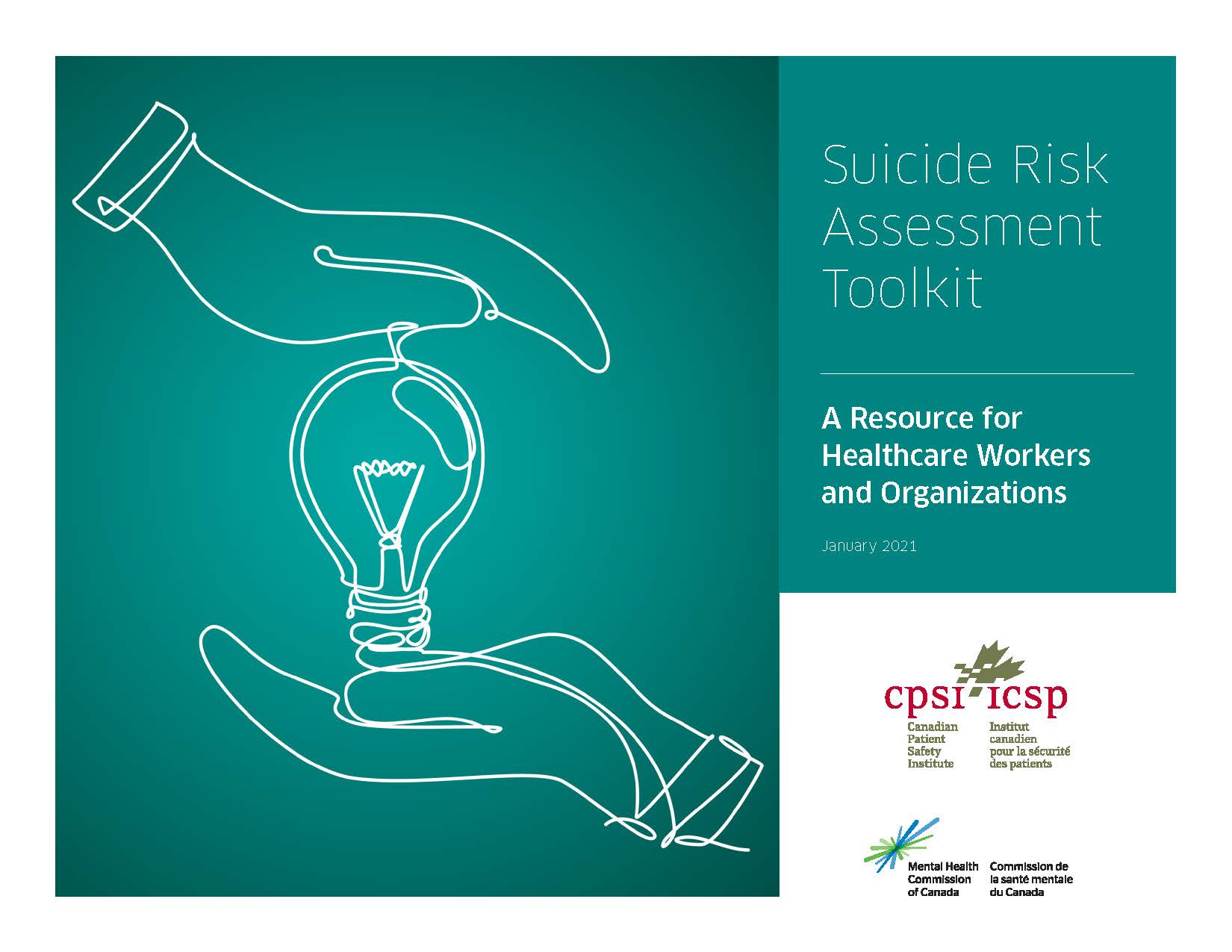If you are in distress, you can call or text 988 at any time. If it is an emergency, call 9-1-1 or go to your local emergency department.
- Professional Resources, Toolkits
Suicide Risk Assessment Toolkit
This resources was published in 2021. The data may be out of date. This Toolkit seeks to provide a high-level overview of what to consider when using suicide risk assessment tools, along with a non-exhaustive list of available tools and their characteristics. It is designed to be a quick, informative guide for healthcare workers and organizations interested in selecting and comparing such tools. The process of assessing suicide risk is complex. While assessment tools play an important role, they should be used to inform, not replace, clinical judgment. Sponsored by: The Canadian Patient Safety Institute and the Mental Health Commission of Canada. Production of this Toolkit has been made possible through a financial contribution from Health Canada. The suicide risk assessment tools in this Toolkit aim to identify (1) specific symptoms or conditions known to be related to risk factors or warning signs for suicide (i.e., symptom assessment), and (2) resilience or protective factors that assess a person’s motivation or determination to live or die. Such tools can be administered through self-report measures or via clinical-administered interviews or observations. They can be administered orally, with pencil and paper, and/or electronically, either independently (as a screening measure) or as part of more comprehensive health or behavioural health assessment. While suicide risk assessment tools are important to the assessment process, they should be used to inform, not replace, clinical judgment and to provide additional information and corroboration to inform clinical decision-making about suicide risk and treatment planning. When possible, these tools should be incorporated into a more comprehensive clinical suicide risk assessment or evaluation and be administered by a trained clinician or healthcare worker (once a therapeutic rapport has been established).What are suicide risk assessment tools and how should they be used?
- Professional Resources, Toolkits
Suicide Risk Assessment Toolkit
Suicide Risk Assessment Toolkit
- Health-care Providers, Suicide Prevention
This resources was published in 2021. The data may be out of date. This Toolkit seeks to provide a high-level overview of what to consider when using suicide risk assessment tools, along with a non-exhaustive list of available tools and their characteristics. It is designed to be a quick, informative guide for healthcare workers and organizations interested in selecting and comparing such tools. The process of assessing suicide risk is complex. While assessment tools play an important role, they should be used to inform, not replace, clinical judgment. Sponsored by: The Canadian Patient Safety Institute and the Mental Health Commission of Canada. Production of this Toolkit has been made possible through a financial contribution from Health Canada. The suicide risk assessment tools in this Toolkit aim to identify (1) specific symptoms or conditions known to be related to risk factors or warning signs for suicide (i.e., symptom assessment), and (2) resilience or protective factors that assess a person’s motivation or determination to live or die. Such tools can be administered through self-report measures or via clinical-administered interviews or observations. They can be administered orally, with pencil and paper, and/or electronically, either independently (as a screening measure) or as part of more comprehensive health or behavioural health assessment. While suicide risk assessment tools are important to the assessment process, they should be used to inform, not replace, clinical judgment and to provide additional information and corroboration to inform clinical decision-making about suicide risk and treatment planning. When possible, these tools should be incorporated into a more comprehensive clinical suicide risk assessment or evaluation and be administered by a trained clinician or healthcare worker (once a therapeutic rapport has been established).
What are suicide risk assessment tools and how should they be used?
SHARE THIS PAGE
RELATED

Review our Assessment Framework for Mental Health Apps — a national framework containing key standards for safe, quality, and effective mental health apps in Canada.

To help expand the use of e-mental health services, we developed four online learning modules based on our Toolkit for E-Mental Health Implementation, in collaboration with the Centre for Addiction and Mental Health (CAMH).

Stepped Care 2.0© (SC2.0) is a transformative model for organizing and delivering evidence-informed mental health and substance use services.

